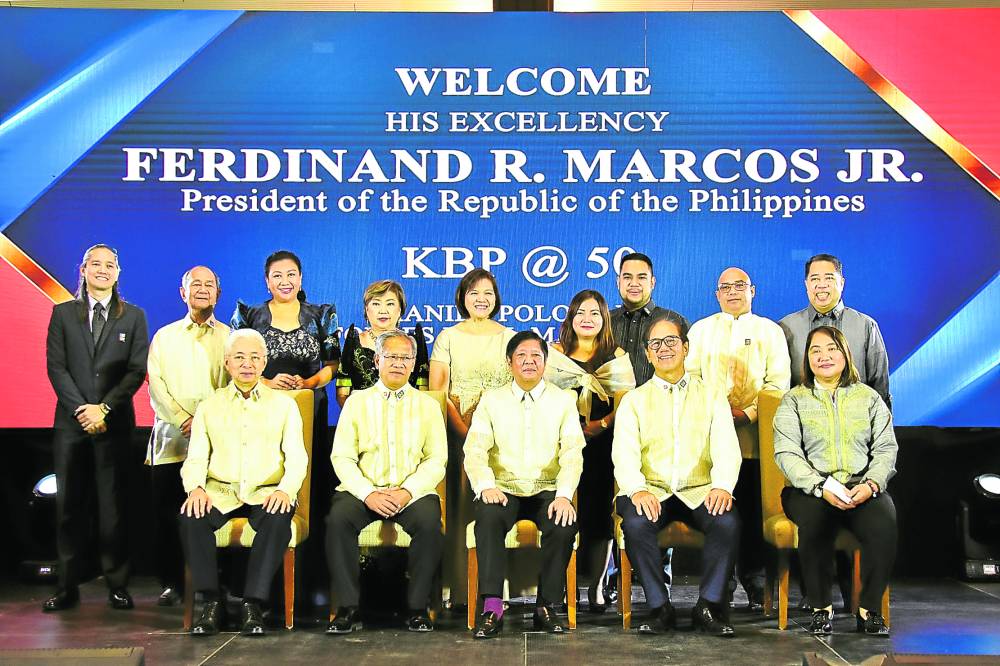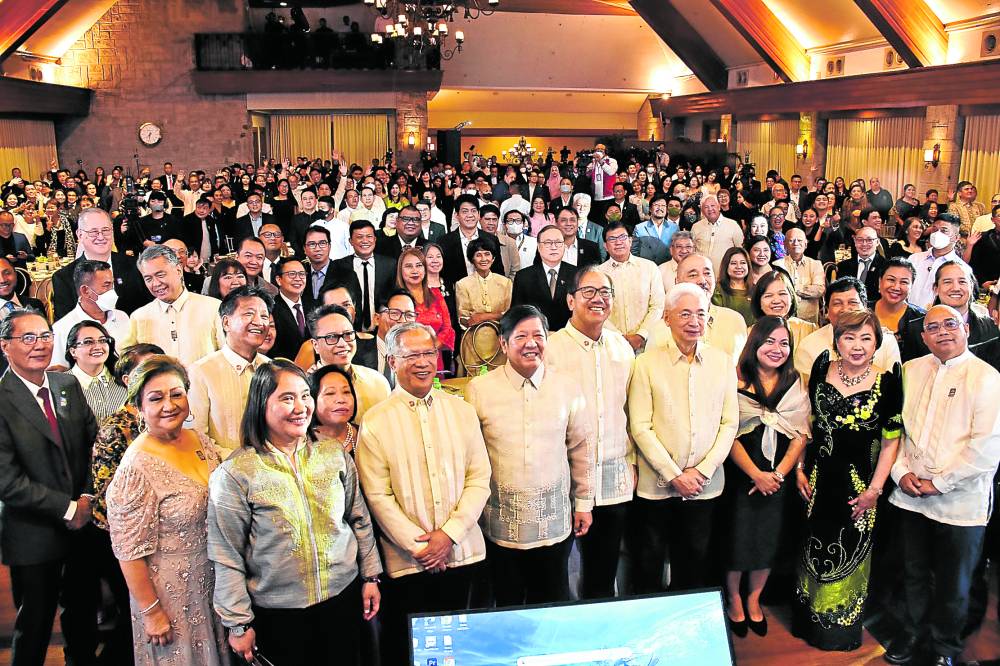KBP Marks 50 Years of Self-Regulation

The Kapisanan ng mga Brodkaster sa Pilipinas (KBP), the national association of broadcasters in the Philippines, celebrated its 50th anniversary at the Manila Polo Club in Makati on April 27, 2023.
Teeming with prominent personalities in the broadcast industry, the golden anniversary gala was filled with reminiscences of the organization’s rich history.
Highlights in the history of the KBP were encapsulated in audio-visual presentations on the organization’s history, families that have served as pillars in Philippine broadcasting, as well as a review of those who have received the Golden Dove’s Ka Doroy Valencia Broadcaster of the Year awards since they were first given in 1991.
Los Cantantes de Manila, which recently won first place in the chamber choir category at Maktoberdorf, Germany, wowed the audience with a medley of Metro Manila Popular Music Festival (MetroPop) grand prize winners. Veteran actress and MetroPop champion Nannette Inventor also sang Original Pilipino Music (OPM) hit songs. Award-winning composers Mon del Rosario and Vehnee Saturno also took the spotlight singing their respective compositions from the most successful local music competition. The late Teodoro F. Valencia, the most prominent of KBP’s founding fathers, made his presence felt in a brief clip paying tribute to Filipino composers.
Upholding Press Freedom
His Excellency President Ferdinand “Bongbong” Marcos Jr. personally graced the event with a promise to continue upholding the freedom of the press and the safety of journalists. He also acknowledged the media’s role in nation-building and in shaping public opinion.
Article continues after this advertisement“I exhort the KBP to continue your very important work with our people and with the government—addressing and remedying the issues and challenges that we face,” Marcos said.
Article continues after this advertisement“Take the lead and foster public discussion, truth, and credibility, the rule of law especially in the practice of broadcasting, news reporting, and information dissemination,” he added.
Marcos assured the Philippine media that they can practice their profession freely and safely under his administration. “For its part,” Marcos said, “this government will remain committed to ensuring transparency and good governance, freedom of expression and of the press, and the protection of media practitioners and their rights in the practice of their profession.” He urged the KBP and its member stations to work as one in upholding the freedom of the press.
Marcos mentioned that while the Philippines may have slipped down to 147th rank among 180 countries in the 2022 World Press Freedom Index, “we shall work hard hand in hand with you to improve the present situation and climb our way up in these rankings.”
Marcos also called on the KBP to combat the rise of misinformation in the interactive media.

President Ferdinand R. Marcos Jr. gamely suggested a “groufie” with kbp members and anniversary guests
“These are among the negative effects of technological advancement and the social media age; however, it is something that is to be expected considering how powerful tool social media has become, and like any other powerful tool, it cuts both ways,” he said. The president exhorted the KBP “to bring a measure of stability, a measure of objectivity, to help our people discern what is the real information and what is propaganda.”
Tribute to Partners
In his welcome remarks, KBP chairman Herman Z. Basbano pointed out that KBP’s milestone anniversary coincides with the centennial anniversary of broadcasting in the Philippines. He paid tribute to members and partners of the association, who through the past 50 years, tirelessly worked to ensure that the KBP remains at the forefront of the industry. He also acknowledged the KBP’s partnership with both government and non-government institutions in supporting advocacies, such as environmental conservation, that contributed to the broadcast media’s continuing relevance in the lives of Filipinos.
Forefront of Self-Regulation
In his message, KBP president Ruperto S. Nicdao Jr. recalled that KBP was born out of a shared desire among industry professionals to address the challenges of the broadcast sector. He said that since its birth, “the KBP has been at the forefront of promoting self-regulation, advancing industry standards, and fostering partnerships with the government, private and public sectors, and the academe.”
“ As we move forward into the next half-century of KBP’s existence, we recognize the challenges and opportunities that lie ahead. The industry continues to evolve and new players and technologies emerge. But our commitment to responsible journalism is firm and resolute. We call on your support as we continue to innovate and adapt to the ever-changing landscape of the broadcast industry,” Nicdao said.
About the KBP
The Kapisanan ng mga Brodkaster ng Pilipinas (Association of Broadcasters of the Philippines) is the preeminent organization of radio and television broadcasters in the Philippines. It is a non-profit, non-stock organization registered with the Securities and Exchange Commission comprising owners and operators of radio and television broadcasting stations in the Philippines, both big and small.
The KBP started in 1973 when a small group of broadcast station owners, whose stations were allowed to reopen after being closed by martial law, got together to find a way to operate viably under the constraints imposed by the government. The group was later joined by other broadcast operators, bringing together under one organization players in an industry characterized by fierce competition.
When the martial law government allowed private mass media (broadcast and print) to set up their regulatory councils in November 1974, the KBP organized the Broadcast Media Council, whose members came from among its ranks, and proceeded to undertake reforms in the industry. These included formulating a broadcast code of ethics, adopting standards for trade and advertising practices, and establishing a self-regulatory system to enforce these standards. It also organized industry-wide training programs to professionalize personnel in the broadcasting industry. When martial law was lifted in 1981 and after the operation of the Broadcast Media Council had ceased, the unity and cooperation that KBP had forged among its members were strong enough for the KBP to carry on the structure of self-regulation formed under the Council.
The KBP represents the interests of radio and television broadcasters in advancing the cause of an independent but responsible broadcast media and staying relevant in Philippine society.
Broadcast Advocacy
KBP promotes the values and benefits of broadcasting as a vital source of information, education and entertainment for the public. It advocates for the rights and interests of broadcasters in policy and regulatory matters and supports the development and innovation of the industry.
Working with Congress
KBP monitors and participates in the deliberations of the Senate and House committees that handle bills and resolutions that may affect the operations and interests of radio and television broadcasters. It also guides its members in complying with the requirements and procedures for the renewal of their broadcast franchises.
KBP’S role in elections
KBP is a key partner of the Commission on Elections (COMELEC) in informing the public about the electoral process and has partnered with the electoral body in organizing debates among presidential and vice-presidential candidates, disseminating election results promptly, and educating citizens about the electoral process.